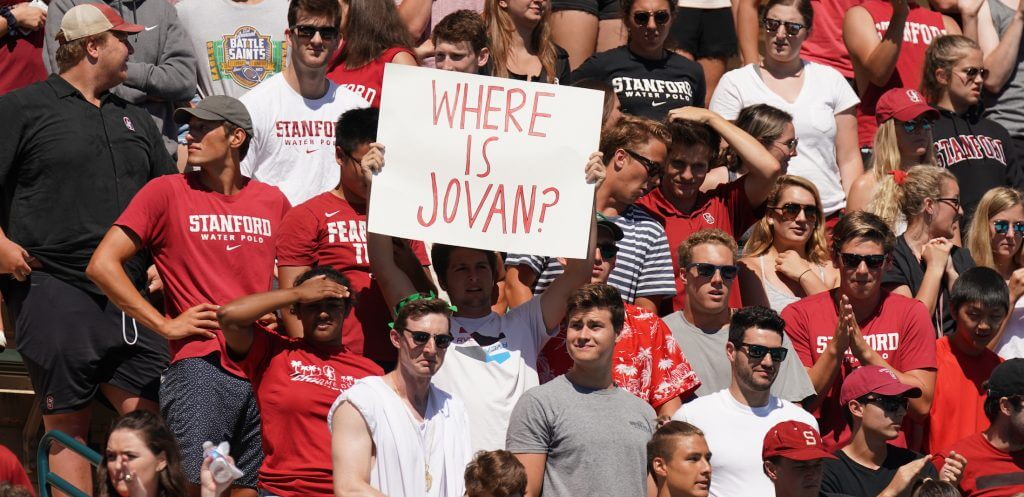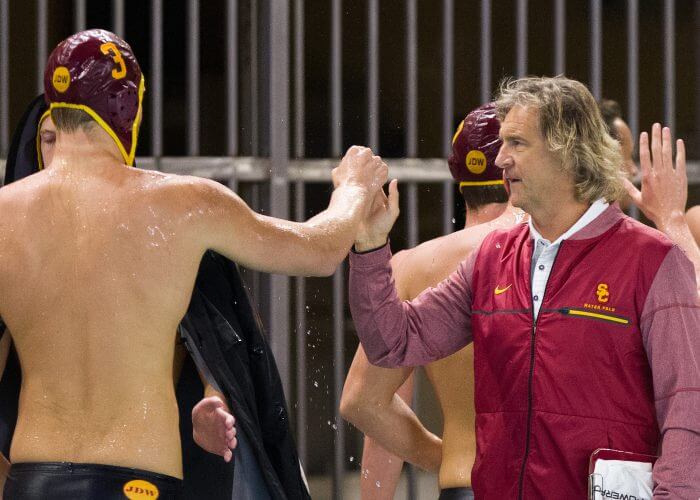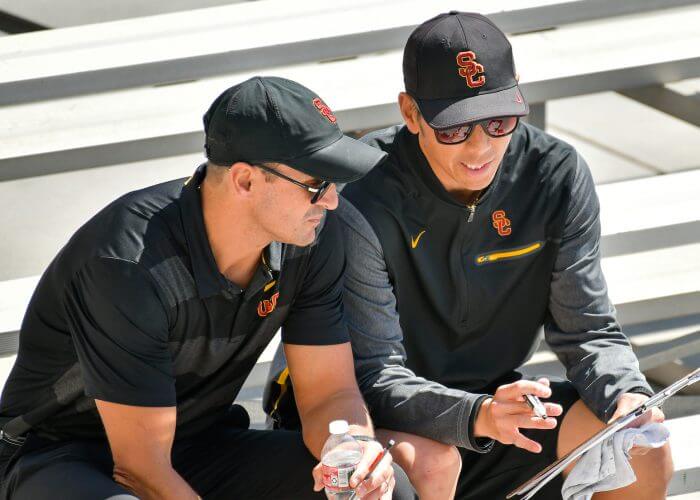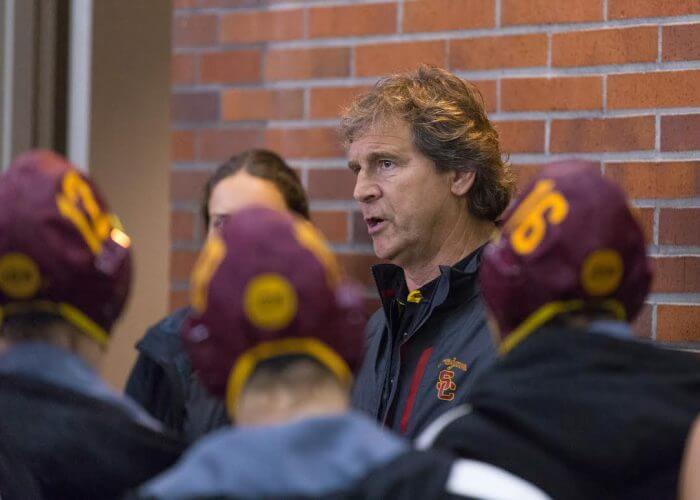Whither Jovan?

Editorial content for the 2019 NCAA DI Men's Swimming & Diving Championships coverage is sponsored by S&R Sport.
See full event coverage.
Follow S&R Sport on Instagram at @srsportaquatics
Editor’s Note: The following opinion piece represents the conclusion of Swimming World’s coverage of the 2019 NCAA Women’s Water Polo Tournament. To find our complete coverage of America’s most important women’s water polo event, please click here.
The 2019 NCAA Women’s Water Polo title match at Stanford’s Avery Aquatic Center would have been memorable under any circumstances. The sport’s two powerhouses, top-ranked USC and second-seeded Stanford, were evenly matched—neither team enjoyed more than a one-goal lead—until Stanford freshman Ryann Neushul’s goal three minutes into the final period decided the match 9-8 in favor of the home team.
[In a Season of Change, One Constant Remains: Stanford Women’s Water Polo Is Again National Champions]
But, since the shocking series of indictments in March in the college admissions scandal dubbed Operation Varsity Blues, in which USC head coach Jovan Vavic was swept up and subsequently fired, circumstances have been anything but normal in the world of collegiate water polo.
[After a Quarter Century in Troy, Jovan Vavic Fired as USC Men’s & Women’s Head Water Polo Coach]
All weekend there was a sense, fleeting but tangible, of something awry. At their finals press conference, USC Interim Head Coach Casey Moon, senior Kelsey McIntosh and freshman Tilly Kearns deliberately avoided mentioning the former coach by name—and it became clear why this year’s NCAA tournament was eerily off-kilter.
Of course, Vavic couldn’t attend any of his former’s squad’s contests. Under indictment for criminal racketeering, the ex-Trojan—who’s fighting the charges—was wise to avoid creating any distractions.
But the absence of the winningest coach in the history of American water polo (1,165-238 total wins; .830 winning percentage), who in 25 years led the Trojan men and women to a total of 16 national championships (10 men’s, six women’s), including last year’s men’s and women’s NCAA finals, was conspicuous. He’s enjoyed success unheard of in any sport, let alone polo.

Always a winning combination; Marko Vavic with his father. Photo Courtesy: Catharyn Hayne
And Jovan wasn’t the only Vavic passionately engaged in Trojan polo—he involved his whole family as well. Four years after she graduated, his daughter Monica remains the all-time leading scorer for the USC women’s program. Son Nikola is number two all-time for the men and played on four NCAA champs. Younger son Marco, a sophomore, was an integral part of the team that captured the 2018 NCAA title.
The Vavics won. All the time.
Hiding in plain sight
Now it’s as if they never existed. At an event that he used to dominate, there was virtually no mention of Vavic. The only time his name came up was when reporters asked the most straightforward question: What was it like to be at an NCAA championship tournament without Jovan?
Any responses were typically a series of deflections, or a reference to how teams were—rightly—focused on their own concerns.
Still, Vavic was missed. He had been part of every NCAA tournament since the format’s creation in 2001. In fact, he’d also been at the National Collegiate Championships that predated the NCAA format four years earlier. And his is a personality that you could never miss—especially on the pool deck.
It’s a credit to Coach Moon that he held the team together, despite a significant amount of scrutiny, sustaining two one-goal losses, both to Stanford. The team is now his and not Vavic’s, a transformation cemented when the Trojans rallied from two goals down with three minutes left against Stanford in the Mountain Pacific Sports Federation final. USC tied the match at the end of regulation, then won it in sudden death overtime on a golden goal by Paige Hauschild.

Marko Pintaric and Casey Moon have taken Vavic’s place. Photo Courtesy: John McGillen
That match was a watershed moment: the Trojans had every opportunity to fold, and they didn’t. If for nothing else, Moon has to be given another shot at coaching next season—assuming the athletic department doesn’t purge everyone from the program, a result of additional violations that may bubble up due to institutional scrutiny.
Even last Sunday’s loss to Stanford in the NCAA final can be counted as a positive. A ball bounce one way or another could have changed the outcome. Throw in the three five-meter penalties that Stanford converted—to none by USC—and it’s clear just how competitive the Trojans were, and how well Moon prepared his team.
Going in a different direction
An open question is: what’s next for Vavic? He has a formidable legal hurdle to overcome; unlike a number of defendants in the Varsity Blues case, he has pleaded not guilty and is fighting the charges. His counsel, Stephen Larson, is a former United States District Judge who understands the challenge of going up against the U.S. Department of Justice, and would not take an unwinnable case. Word has it that Vavic’s approach will be to question the credibility of William “Rick” Singer, the scandal’s alleged mastermind, who implicated the other defendants when indicted by federal agents.
[Varsity Blues Scandal: The (Trojan) Empire Strikes Back!]
If—and it’s a substantial “if”—Vavic can get out from under his legal woes, he’ll not be going back to USC or any other big-time polo program. His reputation is essentially beyond repair, which may, ironically, become a boon to American water polo.
Throughout his career, Vavic’s success has not come without an undercurrent of resentment. It’s not unreasonable to assume that those who would kick him now that’s he’s down—and there are some—couldn’t beat his teams in the water. Most of the muttering had to do with Vavic’s importing of foreign-born players to the American collegiate game, the notion being that somehow this upended American collegiate polo and—by extension—weakened the U.S. Senior Men’s Team. Funny, though, how internationals haven’t seemed to dilute the country’s pool of female collegiate athletes; the American women are still the world’s best.

Photo Courtesy: USC Athletics
A solution for collegiate polo might be to encourage Vavic to leave Southern California and move to Texas, one of the country’s up-and-coming polo locations. In some such scenario, he might take over the club team at University of Texas at Austin, or at another top swimming program, and bring them up to varsity status. Think how much impact a Longhorns men’s or women’s water polo team might have—especially if it were to tap into regional talent given a boost by one of the most successful coaches the sport has ever seen.
Outrageous speculation? Perhaps. But Vavic is only 57. Seventy-year-old Ratko Rudic, arguably the greatest polo coach alive, just came out of semi-retirement to coach Pro Recco. Besides, rumor has it that Vavic recently put his SoCal house up for sale, ostensibly to pay down his legal fees; he’s free to move anywhere. Perhaps USA Water Polo, which has been keen to see polo bloom in Texas, will spring for moving fees—and send a jolt of adrenaline into the sport that will be felt throughout the country.
-Editorials are by the author and do not necessarily reflect the views of Swimming World Magazine nor its staff.





